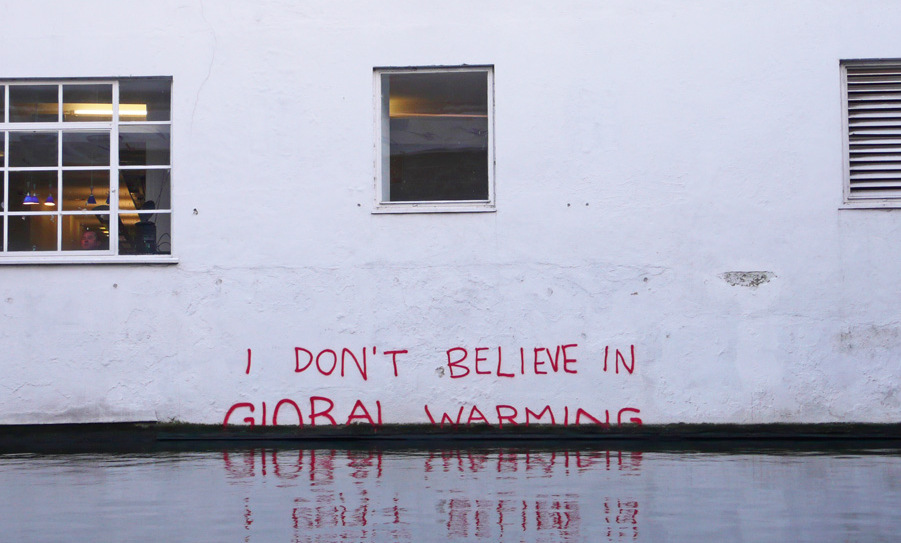A big UN report arrived on Monday, saying in no uncertain terms that the world has up to two decades to massively cut emissions by transforming the global economy if we want to avoid terrible climate impacts.
Given the implications of the Intergovernmental Panel on Climate Change’s (IPCC) findings — government intervention, progressive social policies, more international aid — it’s perhaps not surprising that those who deny climate change is real or a problem pushed back. It took a few days, but the climate science deniers’ response to the IPCC report is now in full flow.
What we see is three distinct layers of climate science denial at play here:
There’s the ‘this isn’t happening’ sun-spot brigade. There’s the ‘this is happening but it’s all a Communist ruse’ zealots. And then there’s the team who reluctantly admit they’ve lost the debate but shoehorn in a number of caveats and excuses to justify why nothing should happen.
‘This isn’t happening’
Over at Steve Bannon’s alt-right hate machine Breibart, James Delingpole calls the IPCC report: “wailing hysteria and worryingly eco-fascistic policy prescriptions”.
Quoting Benny Peiser of the oft-debunked Global Warming Policy Foundation (GWPF), he claims that the climate breakdown “hasn’t been supported by real-world evidence”.
Delingpole draws on an old friend, author Rupert Darwall, to claim that “science” is really just a pretext, devised by “ideological Euro Greenies, to destroy the fossil fuel hegemony of countries like the U.S. and to impose on them a new, eurocentric, renewable energy global tyranny.”
Now in full flow, Delingpole mocks reporting (such as ours) that points to the egregious media coverage in the UK, which favoured Strictly Come Dancing over ecological crisis. He asks, could it be that within the media universe “a few vestiges of the old standards still prevail? That maybe some editors still recognise a complete non-story when they see one?”
The BBC‘s editors decided it was a story, but had a slightly odd approach to covering it.
As DeSmog UK pointed out, Newsnight chose to invite on US climate science denier Myron Ebell.
Ebell is the former head of President Trump’s Environmental Protection Agency (EPA) transition team and a Director of the libertarian US think tank the Competitive Enterprise Institute (CEI).
His appearance has been heavily slated. Environmental writer Mark Lynas described the interview as “utterly pointless and embarrassing. Car-crash television, and a waste of time that could have been used addressing the real questions.”
“If you want political analysis, ask a policy analyst. If you want propaganda, ask Myron Ebell,” said Simon Lewis, professor of global change science at University College London.
Not to be denied their place in the sun, LBC radio got in on the action, giving a platform to GWPF-founder Lord Nigel Lawson to spout his stock in trade — that all this talk of climate action is just “PC claptrap”.
Like what you’re reading? Donate here to support DeSmog UK‘s journalism today
Not content with giving Nigel Lawson a platform, LBC doubled up by bringing Piers Corbyn on to deny not just climate breakdown — “I’ll challenge the IPCC and the professor just speaking, there is no scientific paper in existence that shows that increases of carbon dioxide worldwide drive world temperature rises” — but that coral reefs were under threat.
The IPCC‘s report compiled evidence from more than 6,000 papers. It said 70 to 90 percent of coral reefs would be lost with 1.5C of warming, and almost all with 2C of warming.
‘It’s all a ruse’
Over at Conservative Woman — which regularly runs pieces by Conservative non-woman and GWPF researcher Harry Wilkinson — a headline runs “Top scientist shoots the climate-change alarmists down in flames”. In that article, Wilkinson quotes American climate science denier Richard Lindzen, who the GWPF contrived to give its annual lecture on the day the IPCC report was released.
In an extraordinary talk, Lindzen equates the climate consensus with “the suicide of industrial society”. His talk is a homage to oil and coal arguing: “the power these people desperately seek includes the power to roll back the status and welfare that the ordinary person has acquired and continues to acquire through the fossil fuel generated industrial revolution and return them to their presumably more appropriate status as serfs.”
Lindzen has form. Back in 2017 writing at Merion West, Lindzen argued that believing climate change is largely caused by increases in carbon dioxide is “pretty close to believing in magic.”
In 2015 The Daily Mail reported Lindzen compared people believing in global warming to religious fanatics: “As with any cult, once the mythology of the cult begins falling apart, instead of saying, oh, we were wrong, they get more and more fanatical.”
The Spectator would seem to agree. Its beleaguered editor Fraser Nelson tweeted a sneering comment in support of Ross Clark’s article, in which he states:
“It isn’t hard to spot the problem with issuing frightening-sounding deadlines. If the deadlines come and go, without us managing to lower emissions and yet still life goes on, it makes the people setting the deadlines look rather foolish.”
“It is also somewhat counter-productive. Given the failure of the world to come to an end, it is tempting to say, just as we do when religious cults and other fantasists make doom-laden predictions which fail to come to pass: well, the whole thing must be a hoax. What is the point of listening any further?”
Clark has a long history of climate denial. Back in 2015 he wrote in the Express the sort of paean to fossil fuel capitalism that Richard Lindzen would have been proud of:
“Climate change is not the greatest risk to the world: the biggest danger we face is the economic decline which would result from the loss of the cheap energy which has improved lives beyond all recognition over the past two centuries.”
“You name it: better food, better transport, better medical care. Ultimately, all the fantastic improvements in our lives since 1800 have been down to one thing: our ability to harness energy from fossil fuels.”
In summary: Everything’s getting better forever and ever. Except the IPCC report tells us that’s very much not the case, unless we take radical action.
Like what you’re reading? Donate here to support DeSmog UK‘s journalism today
Which is perhaps why, in a second Breitbart article, Delingpole took aim at the organisations charged with implementing this ‘green tyranny’ that would see a move away from fossil fuels — specifically the Committee on Climate Change’s (CCC) Chief Executive, Chris Stark.
He’s a man full of “revolutionary fervour” for cutting the UK’s emissions and helping the world avoid terrible climate impacts, Delingpole (sort of) writes. “If this doesn’t chill you to the marrow, it should”, apparently.
He’s not the only one that’s scared the CCC might now become empowered. Nick Timothy, a former SPAD for Theresa May who is credited with getting the UK’s Department of Climate Change shut down, urges Telegraph readers to “take back control” from “unaccountable entities” such as the CCC.
And entities such as the Nobel committee, perhaps.
Bjorn Lomborg over at the Wall St Journal took the opportunity to distort the work of just-announced Nobel Prize winner, climate economist, William Nordhaus. Lomborg claims Nordhaus said that “proposed cost of CO2 cuts aren’t worth it”.
But as Carbon Brief’s Simon Evans points out on Twitter, Nordhaus literally wrote in one of his many, many papers on the economic rationale for climate action:
“The future is uncertain so we should have more climate policy, not less.”
As Evans points out, the entire framing used by Lomborg is just wrong:
❌ The @IPCC_CH “urges” leaders to limit warming to 1.5C ❌
Nope. Countries of the world agreed to try & avoid 1.5C. They asked IPCC what it would take to do this, & how the impacts of 1.5C would compare to 2C.
IPCC doesn’t tell anyone what to do.https://t.co/UxmUNs8VA6 pic.twitter.com/NzFQJQI2DP
— Simon Evans (@DrSimEvans) October 10, 2018
In one sense the new ideological discomfort of the shrinking climate denial network is understandable. As the IPCC reports outlines, mass systemic change is required – a systemic change that is incompatible with the economic system the climate science deniers revere.
‘It’s happening, but…’
The Daily Mail – a bastion of climate science denial under former editor Paul Dacre – started uncharacteristically promisingly with Peter Oborne’s excellent report from Bangladesh, which seems to be based on actual facts and actual reporting and firmly grounded in reality.
But then on Wednesday they had Stephen Glover veer from acknowledging the level of crisis, to arguing that it’s all just too expensive so nothing should be done. He writes:
“This week’s IPCC report judged that global warming must be kept to a maximum of 1.5C warmer than pre-industrial levels, rather than the 2C ceiling previously envisaged. How can scientists be so sure that the lower figure should become the new goal?
“I ask because it carries enormous extra costs. The IPCC estimates that new energy infrastructure — wind, solar and electricity storage — as well as technologies that can capture CO2 from the atmosphere, could cost a jaw dropping £1,800 billion.”
“This will be paid for by the likes of you and me.”
Like what you’re reading? Donate here to support DeSmog UK‘s journalism today
He’s not the only one that acknowledges climate change is a problem but isn’t really willing to countenance the solutions.
Rod Liddle in The Sun takes aim first at vegetarians, then at windfarms.
Of the IPCC’s suggestion that we’re going to have to eat a lot less meat, he says: “Climate change is a fact. But when they conflate two issues for reasons of fashion, I begin to smell a rat”.
So Rod isn’t going veggie. But what of another IPCC finding, that the world is going to need a heck of a lot more windfarms? No. He doesn’t fancy that either:
“Wind turbines are a blight on our landscape”, he says, “causing misery wherever they are”.
That’s all pretty normal messaging for newspapers known for objecting to climate policy. But what’s new about the latest spate of climate science denial is its politics.
Having overwhelmingly lost the scientific debate, these groups are now pivoting to a new position which is centred around two ideas: first that the new is too apocalyptic and second that it’s too expensive.
Given what is required is systemic change, they are swiftly changing positions to defend the indefensible — an economic system based on extraction and exploitation of natural resources and mass consumerism that the IPCC tells us must be in its end-phase.
But it’s not all bad…
Amongst the torrent of climate science denial from the usual suspects, there are also a few shoots of refreshing reality appearing. For instance, the normally obstinate Times runs an editorial that breaks with their own columnist Matt Ridley’s vehement do-nothingery and points to the IPCC report to make his stance look absurd:
“The IPCC report’s authors warn that cutting emissions fast enough to keep the planet sufficiently cool could mean a $2.5 trillion hit to global GDP. Others estimate that switching to electric cars will create new industries worth $7 trillion a year in the US alone. It is true that a revolution will be necessary, but it should be bloodless and it will be good for us. So bring it on.”
Image: Duncan Hull/Flickr CC BY 2.0
Subscribe to our newsletter
Stay up to date with DeSmog news and alerts






